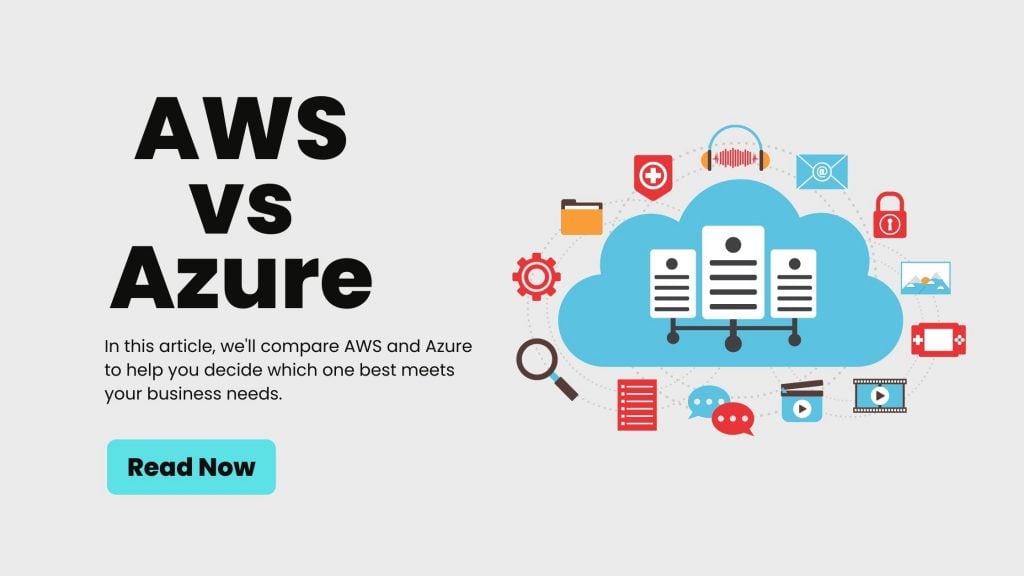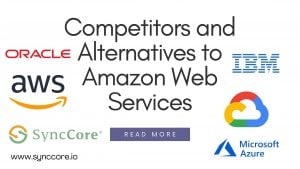AWS vs. Azure: Cloud computing is a hot topic right now. This approach, which makes resources (such as virtual computers, apps, and storage) available to customers via the internet, has become a must-have for businesses looking to cut costs and increase flexibility. Before moving to a cloud-based environment, it’s critical to research all available options and choose the best possible provider. Cloud computing is the platform of choice in today’s age of Big Data and Data Science.
As cloud computing has reached its pinnacle, various cloud service providers have competed for supremacy in the cloud sector. For quite some time, AWS and Azure have been relentless in their pursuit of the top spot. Not only the educational sector, but also a variety of corporations, are attempting to compare AWS and Azure before deciding whether or not to migrate to a cloud-based environment. Both AWS and Azure are strong performers, with nearly identical performance in nearly all use scenarios. The majority of people are concerned about which cloud vendor to choose, namely Azure vs AWS. In this article, we’ll compare AWS and Azure to help you decide which one best meets your business needs.
Table of Contents
AWS vs. Azure

What is AWS?
AWS, or Amazon Web Services, is a cloud computing platform developed and maintained by Amazon. It is the world’s most comprehensive and widely used cloud platform, with over 200 fully-featured services available from data centres worldwide. Millions of clients, including the fastest-growing startups, largest corporations, and top government agencies, rely on AWS to cut costs, improve agility, and accelerate innovation.
AWS services are divided into three categories: Platform as a Service (PaaS), Infrastructure as a Service (IaaS), and Software as a Service (SaaS) (Saas).
AWS provides more services and features than any other cloud provider, ranging from traditional infrastructure technologies such as computation, storage, and databases to emerging technologies such as machine learning and artificial intelligence, data lakes, and analytics, among other things. This makes moving existing apps to the cloud and building almost anything you can think of faster, easier, and less expensive.
What is Azure?
Microsoft Azure is a cloud service platform developed by Microsoft that provides cloud computation, storage, database management, networking solutions, and developer tools, among other features, to help an organisation become more scalable and expansive in its reach and performance. Azure’s services are classified as platform as a service (PaaS), software as a service (SaaS), and infrastructure as a service (IaaS) (IaaS). Using these three services, developers can now build, organise, and manage cloud services and applications.
With over $1 billion invested in research and development and excellent security specialists on hand to protect your data, Azure is the cloud to trust. You can simplify compliance and secure your data with the most comprehensive compliance coverage of any cloud service provider. Azure leads the market with over 90 compliance offerings.
Key Difference
On the surface, Azure and AWS appear to be very similar technologies. They’re designed to cover a lot of the same ground and have similar capabilities for dealing with similar problems. There are, however, some significant differences between the two:
- Although both Azure and AWS provide hybrid cloud services, Azure outperforms AWS.
- On Azure, express routes are available, whereas on AWS, direct connections are available.
- AWS offers greater interoperability with open source communities such as Jenkins, GitHub, and Linux, whereas Azure is simple to use and integrates well with Microsoft’s tools and technologies.
- AWS security is provided through specific roles with access management, whereas Azure security is provided by granting access to the entire account.
- AWS provides a Virtual Private Cloud, whereas Azure provides a virtual network cloud.
- Azure has 140 availability zones compared to AWS’s 61.
Advantages and Disadvantages of AWS
Advantages
Innovation: Many analysts believe that it is not only Amazon Web Service’s low cost, but also its commitment to innovation, that has allowed it to boast of having many of the world’s most well-known corporate brands as clients.
Easy to use: This is at the top of the list of Amazon Web Services benefits. AWS is simple to use because the platform was designed to provide quick and secure access. Users have complete control over their data and can make changes whenever and wherever they want. For most businesses, starting with AWS as a cloud provider is far easier than starting with Azure or Google Cloud Platform. AWS provides all of the information, documentation, and video tutorials you need to learn how to use all of its services.
Cost-effective: Whether you’re a small business or a large corporation, you can only save money if you can use the services that your company requires. When compared to competing on-premises services, AWS offers more cost-effective pricing. Consider the cost of running your apps on-premises or in a co-location facility. That has the potential to be enormous. The cost-effectiveness of AWS is one of its most appealing features.
Security: AWS prioritises safeguarding your organisation against potential data breaches and hacking threats. They have several reputable compliance certifications and follow international security regulations.
The use of the AWS platform by companies such as NASDAQ, HealthCare.gov, and Dow Jones demonstrates how reliable and secure it is as a cloud service. You can use CloudTrail and Identity and Access Management (IAM) to keep track of all tasks completed by different clients. To regulate access to events, you can create built-in firewall rules that range from completely open to completely private, or somewhere in between.
Scalability and flexibility: Whether you’re migrating from another cloud service platform or moving to the cloud for the first time, AWS has everything you need to improve your IT infrastructure. Their methodology allows you to scale assets up or down, so you won’t have to worry about volume or changing needs. AWS provides technologies such as Auto Scaling, AWS Tools, and Elastic Load Balancing to help us reduce the amount of time we spend on work. You can select them based on your requirements. These programmes are accessible whenever you require them.
Disadvantages
Limitation on resources: AWS imposes resource constraints by default, which vary depending on location. These resources are made up of images, volumes, and snapshots. You can only run a limited number of instances per region. It also provides very little information about Amazon EC2 and Amazon VPC console resources. You may, however, request a higher limit.
Limitations on security: AWS restricts certain features that cannot be changed because security is one of the most important features. These are the characteristics that cannot be changed:
Classic EC-2: Each Security Group can have up to 100 permissions, and each instance can have up to 500 permissions.
Each VPC in an EC2-VPC can have up to 100 security groups.
Cloud computing issues:
AWS has standard cloud computing concerns when moving to the cloud, such as downtime, limited control, and backup protection. It could be due to a power outage or a network outage with the cloud provider. These flaws, on the other hand, can be corrected over time. As a result, they are only a short-term issue.
Advantages and Disadvantages of Azure
Advantages of Azure
Improved scalability: Even though business demands change over time, whether for expansion or downsizing, scalability is an important consideration for any infrastructure-related investment. The public cloud infrastructure provided by Microsoft Azure allows businesses to scale up their storage and processing capacity on-demand, ensuring maximum capacity during peak traffic periods and long-term growth initiatives. It is easily scalable to meet your IT needs.
Business sustainability: The Microsoft Azure stack of technologies includes built-in analytical tools for shaping and visualising data for better decision-making. Companies can improve their business operations by using real-time dashboards that include customer response times, data and information flow and processing, and the ability to analyse large amounts of data. Advanced analytics can help businesses segment customers based on their behaviour and provide a more personalised experience, increasing customer satisfaction.
Higher availability and redundancy: Unlike many of its competitors, Microsoft Azure provides high availability and redundancy across all of its data centres. Azure is well-suited to organisations with a global reach because it operates in 55 regions and is available in 140 countries. Because of its massive footprint, Microsoft is able to offer a service-level agreement that guarantees 99.95 percent availability, which equates to less than 4.5 hours of downtime per year.
Cost-effective platform: Microsoft’s pay-as-you-go model allows you to pay only for the resources you use while developing or growing your applications using Azure services. Because Microsoft manages infrastructure on Azure, IT management costs are kept to a minimum. It connects datacenters to the cloud seamlessly and, unlike any other cloud provider, covers 42 regions.
Hybrid capabilities: Azure is distinct in that it provides hybrid capabilities. Azure provides simple mobility and a consistent platform across on-premises and public clouds. Azure provides a broader range of hybrid connections, including virtual private networks (VPNs), caches, content delivery networks (CDNs), and ExpressRoute connections, to improve usability and speed.
Security and disaster recovery: Security, compliance, and disaster recovery – Microsoft understands the importance of data security and has built Azure to keep you one step ahead of the competition. Azure has several compliance certifications and is a popular cloud service provider in high-risk industries such as health care and government. Both the platform and the end users are secure. Additional services available to meet corporate demands include multi-factor authentication and advanced disaster recovery capabilities that can restore data in a matter of hours.
Disadvantages
Requires management: Microsoft Azure, like anything else, has some potential drawbacks. In contrast to SaaS systems, where the end-user consumes information, IaaS (Azure) moves your company’s computational capacity from your data centre or office to the cloud (for example, Office 365). Azure, like most cloud service providers, necessitates skilled management and upkeep, such as patching and server monitoring.
Requires expertise: Unlike local servers, Microsoft Azure requires the use of expertise to ensure that all critical components are operational. Over-provisioning cloud services is a common error made by company administrators. Minor errors in the cloud are difficult to detect, costing the company thousands of dollars each year.
Improved scalability: Even though business demands change over time, whether for expansion or downsizing, scalability is an important consideration for any infrastructure-related investment. The public cloud infrastructure provided by Microsoft Azure allows businesses to scale up their storage and processing capacity on-demand, ensuring maximum capacity during peak traffic periods and long-term growth initiatives. It is easily scalable to meet your IT needs.
Conclusion
AWS and Azure are similar in many ways, but they differ in others. In all honesty, comparing these two platforms would be an unfair comparison. After all, the cloud platform you select is determined by the needs of your business. Both of these systems have their own set of benefits and drawbacks that users must deal with. And one of these two options will help your business and its online reputation.
According to the preceding points, there are advantages on both sides and no clear winner. Everything is up to the user.
Our Recommendation
The needs and understanding of the service’s features and pricing will determine which option is best for your company.
For businesses, selecting the right cloud vendor is critical. In today’s Cloud strategy, SyncCore provides a hybrid solution, PaaS, and a variety of other essential capabilities. Many businesses have increased their revenue by migrating to SyncCore Cloud.
SyncCore is a far better alternative to GCP, AWS and Azure. If you require cloud services, please contact us at [email protected] or visit our website at www.synccore.io.
Read More:
Why SyncCore is considerably a better choice compared to AWS?
Comparing Amazon Web Services, Microsoft Azure, Google Cloud & SyncCore Cloud



